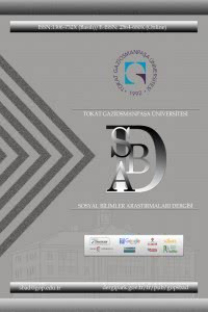V.S. NAIPAUL’ÜN MİSTİK MASÖR’ÜNDE BİR ENTRİKACININ PORTRESİ
Kolonizasyon, dünyanın birçok yerinde çok çeşitli sonuçları olan uzun vadeli bir ekonomik sömürü sürecidir. Bu süreçten çok sayıda edebi eser etkilenmiştir. V. S. Naipaul, bu edebiyat türünde önemli yapıtlar ortaya koymuş bir yazardır. Naipaul'un doğduğu ülkenin de yüzyıllar boyunca sömürgeleştirilmiş bir ülke olması, bu türde seçkin yapıtlar üretmesinin nedenlerinden biridir. Mistik Masör, sömürgeleştirilmiş bir ada ulusunun durumuna eleştirel yaklaşan dikkate değer bir romandır. Sömürge süreci, ezilen toplum üyelerinin karakter şekillenmesi üzerinde önemli bir etkiye sahip olmuştur. Naipaul yapıtlarında bu karakter yapısını başarılı bir şekilde resmetmektedir. Bu karakterlerden biri Mistik Masör'ün ana karakteridir. Romanın en dikkat çekici özelliği, Naipaul'un kahramanı açıkça eleştirmemesi, bunun yerine onu bir kahraman olarak tasvir etmesidir. Bu gerçek anlamda bir kahramanlık değildir; aslında toplumun geliştirdiği karakter yapısına yönelik ciddi bir eleştiri vardır. Toplumun gerilemesinin, bozulmasının ve güçlü bir kimlikten yoksun kalmasının bazı nedenleri vardır. Bu büyük ölçüde sömürge sürecinden kaynaklanmaktadır. Sonuç olarak Naipaul, Ganesh karakteri üzerinden hem toplumu hem de toplumun bu duruma düşmesine neden olan sömürgeci güçleri eleştirir. Bu makalede sömürge sürecinin ortaya çıkmasına neden olan düzenbaz bir karakter konusunu incelenecektir.
Anahtar Kelimeler:
Kolonizasyon, Ganesh Ramsumair, Entrika, Başarı
V. S. NAIPAUL’S THE MYSTIC MASSEUR; THE PORTRAIT OF A TRICKSTER
Colonization is a long-term economic exploitation process with a wide range of consequences in many parts of the world. This process has influenced numerous literary works. Naipaul’s country of birth has been colonized for ages, which is why he produced outstanding works in this genre. The colonial process had a significant impact on subjugated society members' character development. In his works, Naipaul successfully shows this character structure. One of such characters is the main character of The Mystic Masseur. The novel's most notable feature is that Naipaul does not openly criticize this character, instead portrays him as a hero. This is not true heroism; there is a severe critique of the character structure that the society has developed. There are specific reasons why society has regressed, deteriorated, and deprived of a strong identity. This is primarily due to the colonization process. As a result, through the Ganesh character, Naipaul criticizes both society and the colonial forces that caused the society to fall into this state. The issue of a trickster character who has emerged as a result of the system and conditions will be examined in this article.
Keywords:
Colonization, Ganesh Ramsumair, Trickster, Success,
___
- Angrosino, M. V. (1975), “V. S. Naipaul And The Colonial Image” Caribbean Quarterly, 21(3): 1-11
- Bawer, B. (2002), “Civilization and V. S. Naipaul” The Hudson Review, 55(3): 371-384
- Blodgett, H. (1974), “Beyond Trinidad: Five Novels by V. S. Naipaul”, South Atlantic Quarterly, 73: 388-403.
- Goodheart, E. (1981), “Naipaul and the Voices of Negation”, Salmagundi, 54: 44-58
- Lee, R. H. (1966), The Novels Of V. S. Naipaul. Theoria: A Journal of Social and Political Theory, 27: 31-46
- Mann, H. S. (1984), “Variations on the Theme of Mimicry: Naipaul's The Mystic Masseur and The Suffrage Of Elvira” Modern Fiction Studies, 30(3): 467-485
- Naipaul, V. S. (2003), Mistik Masör, Translated by: Namık Süha Sertabiboğlu, İletişim Yayınları.
- Simpson, L. (1984), “Disorder and Escape in the Fiction of V. S. Naipaul”, The Hudson Review, 37 (4): 571-577
- ISSN: 1306-732X
- Yayın Aralığı: Yılda 2 Sayı
- Başlangıç: 2006
- Yayıncı: Gaziosmanpaşa Üniversitesi Sosyal Bilimler Enstitüsü
Sayıdaki Diğer Makaleler
V.S. NAIPAUL’ÜN MİSTİK MASÖR’ÜNDE BİR ENTRİKACININ PORTRESİ
İKLİM DEĞİŞİKLİĞİ İLE MÜCADELEDE TÜRKİYE İÇİN KARBON VERGİSİ ÖNERİSİ
Işıl F. Orkunoğlu ŞAHİN, Taha Emre ÇİFTÇİ
İNGİLTERE’NİN YÜN İMPARATORLUĞUNA DÖNÜŞME SÜRECİ: III. EDWARD’IN YÜN POLİTİKASI
Tolgahan KARAİMAMOĞLU KARAİMAMOGLU, Sultan GÜRSOY
DÜŞMANLARIN NEZAKETİ ROMANINDA SİYASAL İSLAM/OFOBİ
COVİD-19 PANDEMİ SÜRECİNDE KADINLARIN EV İÇİ YÜKÜMLÜLÜKLERİ
SWARA VE MAIRCA YÖNTEMLERİ İLE BANKACILIK SEKTÖRÜNDE PERSONEL SEÇİMİ
Ayşe Elif YAZGAN, Halima AGAMYRADOVA
İZMİR SPOR TARİHİ İÇİN YENİ BİR BELGE: İZMİR İDMAN YURDU NİZAMNAMESİ
BULANIK AHP VE TOPSIS YÖNTEMLERİNİN YÖNETİCİ SEÇİM PROBLEMİNE UYGULANMASI
